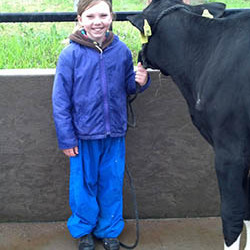 It's the time of year when children dream. And there is no better time to "dream big" than Christmas. There seems to be less guilt about asking for things during the holidays as compared to other times of the year. For a few young boys and girls, a registered calf is on their wish list.
It's the time of year when children dream. And there is no better time to "dream big" than Christmas. There seems to be less guilt about asking for things during the holidays as compared to other times of the year. For a few young boys and girls, a registered calf is on their wish list.As with any new pet, there will be responsibilities to undertake if a calf is the gift under the proverbial tree. It is the responsibility of the parent and the child to work together to make caring for the new addition a learning experience, including animal care, nutrition and the cycle of life.
Some young people live on a farm and might receive a calf from their farm to call their own, but others may not have that luxury. So, what do you need to consider when acquiring a calf for a child?
I asked a good friend of mine, David Lentz, for some input. He is well-versed in dairy cattle sales, but more importantly, in this case, working with young people to help foster their enthusiasm for dairy. As a junior advisor and now as director of sales for the Pennsylvania Holstein Association, he has provided guidance to parents and youth when making purchasing decisions. He shared a few of his thoughts with me, and we developed some tips for first-time purchasers of registered heifers.
- Identify your goal. At what level of competition do you want your child to succeed? Will it be a sound calf, a blue ribbon winner at the county fair, or are the goals loftier? This will determine your budget.
- Grow together. Select a calf that will match your child's size. A yearling heifer for a young child can be too large and may deter their enthusiasm for showing. If the animal is too large, it could overpower the child and make training the animal nearly impossible. The experience should be positive, so planning ahead makes it more enjoyable for the youth, their parents and the animal.
- Select a calf with a future. One with a solid pedigree, along with the calf's conformation, will not only get you the show ring success you seek, but, in the long run, could help build animal numbers through her heifer calves.
- Education. A great calf under less than ideal housing and management can stifle their development. It is important to be educated on proper feeding and housing for the animal's age. The animal's overall performance is influenced by genetics and 75 percent is management. The care the animal receives weighs heavily on its success.
Whatever their final selection, it will be a gift and an enduring experience they will forever remember.

The author is the online media manager and is responsible for the website, webinars and social media. A graduate of Modesto Junior College and Fresno State, she was raised on a California dairy and frequently blogs on youth programs and consumer issues.









